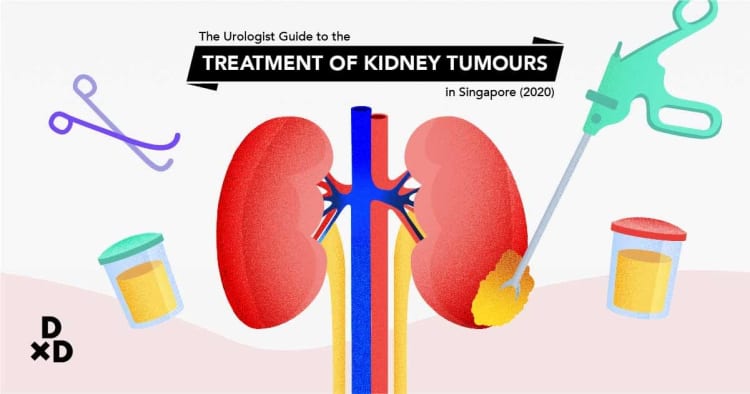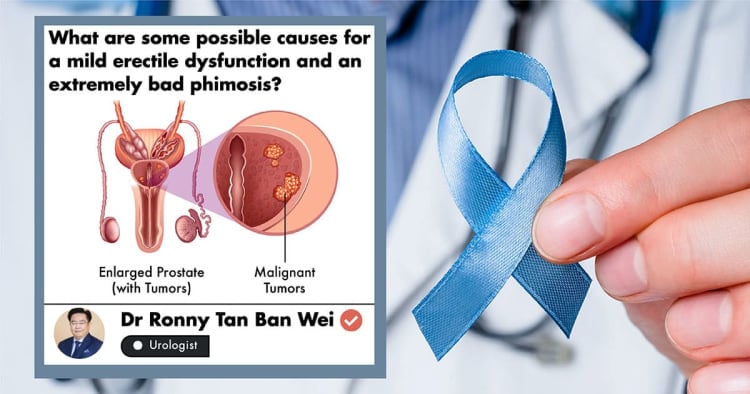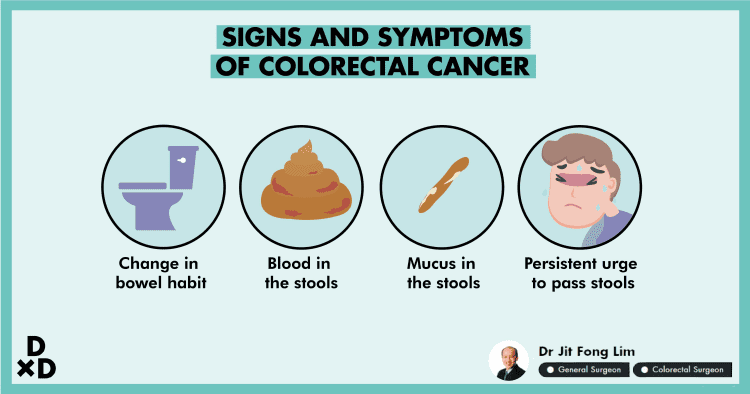When we think of diseases related to kidneys, the first thought that comes to our minds is usually kidney failure.
However, another kidney disease that may affect not only our quality of life but may also threaten our lives is the development of kidney tumours.
In fact, an abnormal growth in the kidneys is probably the last thing most people will suspect.
So why should we be worried about kidney tumours?
What are Kidney Tumours?

Kidney tumours (renal masses) are abnormal growths found within the kidney and can vary in size [1].
While most people panic at the term ‘tumour’ due to the common association of this term with cancer, not all tumours are cancerous.
The more common types of kidney tumours can be classified according to the nature of the growth, such as [2]:
- Benign Renal Tumour
- Renal Cell Carcinoma Tumour
- Wilms’ Tumour
1. Benign Renal Tumour
Benign renal tumours are relatively ‘harmless’, non-cancerous abnormal growths in the kidney and one of the most common diagnoses of benign renal tumours are angiomyolipomas (pronounced ‘en-gee-o-mai-o-li-po-ma-s’) [3].
These types of benign renal tumours are usually made up of fat tissue, muscle, and blood vessels, resulting in a bulge-like appearance.
2. Renal Cell Carcinoma Tumour
Renal Cell Carcinoma (RCC) tumours (renal cell cancer / renal cell adenocarcinoma) are abnormal growths of cancerous (malignant) tissue cells and is one of the most common forms of Kidney Cancer in adults.
In addition, RCC is also one of the top ten worldwide most common cancers [4].
RCC tumours can be found in the small tubes of the kidney(s) (proximal convoluted tubules) and may develop according to the TNM (Tumour, Nodes, Metastasis) staging system.
The TNM staging system serves as a guiding description of the progression of RCC kidney cancer and is based on [5]:
- Size of the tumour
- The extent of tumour spread (Metastasis)
- Impact on the regional lymph nodes
The progression of RCC kidney cancer is outlined in 4 phases and involves the following stages:
Stage 1:
The tumour growth is contained within the kidney(s).Stage 2:
The tumour growth is more than 7 cm within the kidney(s).Stage 3:
The tumour growth has grown or spread into nearby lymph nodes and/or large veins. In more severe cases, cancer may have spread to other organs as well.Stage 4:
Cancer has advanced into the last stage and has spread to other distant organs and/or various parts of the lymph system (metastasis).
While tumours may be non-cancerous (benign) or cancerous (malignant), chances of renal tumours, especially larger renal tumours, being cancerous rather than non-cancerous, is significantly higher [6].
3. Wilms’ Tumour
Wilms’ tumour (nephroblastoma) is cancerous (malignant) and is one of the most common types of childhood cancer originating typically in one of the kidneys [7].
Wilms’ tumour typically affects children who are below 5 years of age, including newborns and are resultant of developmental defects of the kidney in the womb [8].
Which Doctor should I go to for Kidney Tumour treatment in Singapore?
Most of us might visit our general practitioners first, either for other health-related conditions or symptoms of abdominal discomfort (pain around the sides or noticeable lumps).
Following this, the general practitioner may then refer the patient to a urologist.
A urologist is a doctor specialising in the treatment of the conditions and diseases about the urinary system [21]. This includes various ailments ranging from kidney stones to urological cancers such as:
- Kidney cancer
- Bladder cancer
- Prostate cancer
- Urethra/ureter cancer
- Testicular cancer
- Vaginal cancer
What can I claim from Medisave for Kidney Tumours?
Treatment
Medisave claimable amount
Stereotactic Radiotherapy
$2800 per treatment
Where can I Seek Treatment for Kidney Tumours in Singapore?
There are many public and private medical institutions in Singapore offering treatment services for kidney tumours in Singapore. Some of these medical institutions include:
Public Hospitals / Clinics
- Alexandra Hospital
- Changi General Hospital
- Jurong Medical Centre
- Khoo Teck Puat Hospital
- KK Women’s And Children’s Hospital
- National Cancer Centre
- Ng Teng Fong General Hospital
- Singapore General Hospital
- Sengkang General Hospital
- Tan Tock Seng Hospital
Private Hospitals / Clinics
- Concord International Hospital
- Farrer Park Hospital
- Gleneagles Hospital
- Mt Alvernia Hospital
- Mt Elizabeth Hospital
- Mount Elizabeth Novena Hospital
- Parkway East Hospital
- Raffles Hospital Pte Ltd
- Starmed Specialist Centre Pte Ltd
- Thomson Medical Centre
What are the Symptoms of Kidney Tumours?

As it is with most ailments non-visible to the naked eye, it is easy to miss tell-tale signs and symptoms of kidney tumours. In fact, quite a few detections of kidney tumours/masses are identified incidentally during screening [9].
So what should you be looking out for?
The majority of benign renal tumours and RCC tumours typically do not present with symptoms (they are asymptomatic) [10].
However, some cases do observe certain conditions associated with kidney tumours, such as:
- A noticeable bump/lump around the abdomen (Palpable Mass)
- Pain in the sides of the abdomen (Flank Pain)
- Blood in the urine (Haematuria)
- Feeling anaemic (low counts of red blood cells)
- Urinary Tract Infection
- Kidney (Renal) Failure
Individuals suffering from RCC tumours might also experience the following symptoms and conditions in addition to those overlapping with benign renal tumours, such as:
- Hypercalcaemia (high counts of calcium levels in the blood)
- Fever
- Erythrocytosis (increased red blood cell count)
This may increase the risk for blood clots, heart attacks and strokes
These symptoms may present due to hormonal changes as a result of tumour secretions or arise as the body’s immune system responds against the tumour.
How do I get Diagnosed for Kidney Tumours in Singapore?

With a high number of cases with patients suffering from kidney tumours showing little or no symptoms at all (asymptomatic), detecting kidney tumours becomes more difficult and challenging.
In several other cases, kidney tumour detection occurs after screening tests for other health concerns.
While the detection rate of kidney tumours is relatively low, advancements in non-invasive medical technology over the years, in particular imaging techniques, has significantly increased the detection rate of kidney tumours. These procedures include [11]:
- Ultrasound
- CT (Computed Tomography) Scan
- MRI (Magnetic Resonance Imaging)
These screening procedures are also able to determine the nature of the kidney tumour and assess if it is non-cancerous (benign) or cancerous (malignant).
In addition, physical examinations may also be conducted to inquire further about family and medical history. Such procedures include [12]:
- Checking for lumps
- Blood tests
- Analysis of urine sample (Urinalysis)
What Kidney Tumour Complications are there?
Some cases of kidney tumours could potentially lead to other health conditions arising.
1. Benign Renal Tumour
Although benign renal tumours are non-cancerous, they might induce some medical conditions and lead to certain health concerns such as [13]:
- Increased risk of internal bleeding (Haemorrhage)
- Impairment/weakening of kidney function
- Development of long term (chronic) kidney disease
- Kidney (renal) failure
2. Renal Cell Carcinoma Tumour
Patients whose kidney tumour is found to be cancerous in nature and belonging to the RCC kidney cancer may have cancer spreading and developing in other parts of the body in later stages (metastasis) and in severe cases, death.
Research has shown that cancer may spread to other organs of the body in an estimated one-third of patients who suffer from RCC kidney cancer [14].
The spread of cancer cells could implicate other organ functions and lead to complications involving those organs. Studies have shown that there is a correlation between the size of the tumour and risk of spread [15].
The more common areas of the body where cancer cells from RCC tumours spread to include:
- Lung(s)
- Liver
- Bones
- Lymph nodes
This is because of the nature of the tumour being interconnected with blood vessels, resulting in an increased risk of cancer spreading.
What are some of the causes of Kidney Tumours?

While there is no known definitive cause of kidney tumours at present, certain factors have been identified clinically to increase the risk of developing kidney tumours in adults. These factors include [16]:
- Smoke from cigarettes (first hand or second hand)
- Obesity
- Family history
- High blood pressure (Hypertension)
- Exposure to hazardous substances (workplace hazards etc.)
- Inherited medical conditions
- Hormones (for benign renal tumours)
Who is at risk of developing Kidney Tumours?

At this point in time you may be wondering: Am I at risk of developing a kidney tumour?
Studies have shown that it is two times more likely for females to develop benign renal tumours as compared to males [17].
The potential for abnormal growth of non-cancerous tumours has also been observed to be higher in pregnant females as opposed to non-pregnant females [18].
However, for the case of RCC tumours, it has been found that males are more likely to develop RCC cancerous tumours as compared to females.
Furthermore, the potential for the development of RCC tumours has been found to be significantly higher in older patients (40 years and above) as compared with younger patients.
What are some Treatments of Kidney Tumours in Singapore?
Having identified the symptoms and undergone diagnosis, what can you expect from kidney tumour treatment?
1. Benign Renal Tumour
The most common form of benign renal tumours, angiomyolipomas, typically do not present with symptoms and seldom require medical intervention.
However, for the few cases that do develop symptoms, several treatment procedures are available to target the tumour, including [19]:
- Percutaneous drainage of the tumour
- Surgical removal of the tumour (Excision)
2. Renal Cell Carcinoma Tumour
In the treatment of RCC cancerous tumours in Singapore, radical nephrectomy is recognised as the gold-standard treatment in targeting RCC tumours.
Radical Nephrectomy is the surgical removal of the entire affected kidney, including part of the interconnecting tube linking the kidney to the bladder [20]. In cases whereby the tumour site is near or affects the adrenal gland, the adrenal gland may be removed as well.
Some of the kidney removal (radical nephrectomy) treatment procedures include:
Open Surgery involving incisions to the abdomen, loin, or thoracic-abdomen
Transperitoneal Laparoscopic Surgery
Retroperitoneal Laparoscopic Surgery
Nephron-Sparing Surgery (NSS)
Open / Partial laparoscopic partial nephrectomy (partial removal)
Ablation techniques
Renal Cryotherapy
Radiofrequency Ablation
High-Intensity Focused Ultrasound
Microwave Thermotherapy
Laser Interstitial Thermal therapy
Interstitial Photon Radiation Ablation
Conclusion
Kidney tumours can be scary, but you have a selection of treatment options available from a wide array of clinics and hospitals. A kidney tumour does not automatically mean that you have cancer, because some of them are benign or harmless. So visit your local urologist for a check-up!







